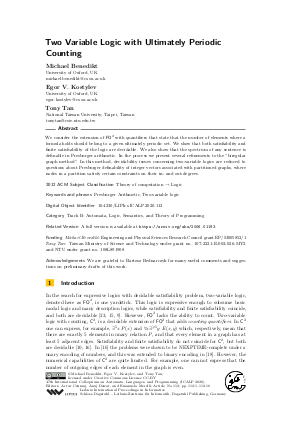@InProceedings{benedikt_et_al:LIPIcs.ICALP.2020.112,
author = {Benedikt, Michael and Kostylev, Egor V. and Tan, Tony},
title = {{Two Variable Logic with Ultimately Periodic Counting}},
booktitle = {47th International Colloquium on Automata, Languages, and Programming (ICALP 2020)},
pages = {112:1--112:16},
series = {Leibniz International Proceedings in Informatics (LIPIcs)},
ISBN = {978-3-95977-138-2},
ISSN = {1868-8969},
year = {2020},
volume = {168},
editor = {Czumaj, Artur and Dawar, Anuj and Merelli, Emanuela},
publisher = {Schloss Dagstuhl -- Leibniz-Zentrum f{\"u}r Informatik},
address = {Dagstuhl, Germany},
URL = {https://drops.dagstuhl.de/entities/document/10.4230/LIPIcs.ICALP.2020.112},
URN = {urn:nbn:de:0030-drops-125197},
doi = {10.4230/LIPIcs.ICALP.2020.112},
annote = {Keywords: Presburger Arithmetic, Two-variable logic}
}

 Creative Commons Attribution 3.0 Unported license
Creative Commons Attribution 3.0 Unported license























